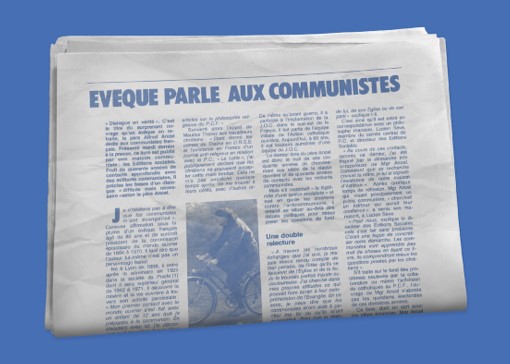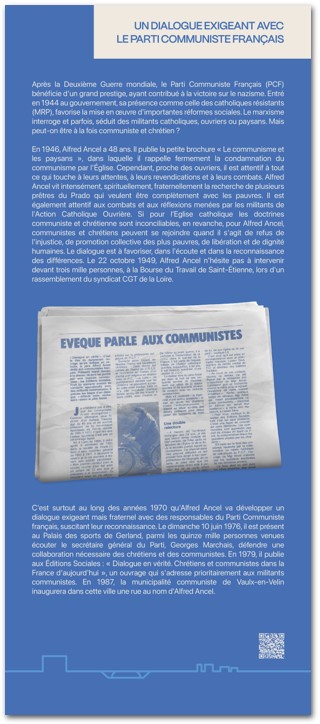
Alfred Ancel and the Communists, Pierre Crépel
Alfred Ancel (1898-1984), born in Lyon, a member of the textile bourgeoisie, volunteered in 1915, ordained a priest in 1923, Superior General of Prado (1942-1971), auxiliary bishop of Lyon (1947-1973), bishop at work but not a working-class priest (1954-1959), an active and influential figure at the Second Vatican Council (1962-1965), wrote extensively. He was one of the key figures in the dialogue between Communists and Christians in the twentieth century.
The Association of the Priests of Prado was founded in 1860 by Father Antoine Chevrier (1826-1879), a priest of the diocese of Lyon, with a view to evangelising "the poor, the ignorant and the sinners", because God became poor in Jesus Christ, born in a stable, Jesus Christ remained poor until his death on the cross, and it is a question of truly living this out. Although Prado originated in Lyon, its priests today officiate in many countries around the world.
In 1946, Alfred Ancel was 48 years old. Christians and Communists had been united in the Resistance; the PCF had great prestige; it took part in the government and introduced much-appreciated measures, such as social security and the status of tenant farming. As a result, Christians, including peasants, often wondered whether they could join forces with the Communists, take joint action, or even more. It was at this point that Alfred Ancel published the small brochure Le Communisme et les paysans.
One of the conclusions, p. 83, reads: "Consequently, Communists should not be surprised when the Church says:
The worker priests
Life then was first and foremost about the working class and the class struggle. Alfred Ancel did not wait for the aftermath of the war to share the plight of the poor and the workers - that was the very vocation of Prado. But things were coming of age, and within it, the experience of working-class priests and priests at work. The informal movement of working-class priests was born around the time of the Liberation. In 1949, there were only about fifty of them. Their motivations varied, depending on the individual: serving the working class, evangelising and/or competing with the Communists. After the great strikes of 1947, the workers' conscience hardened in the struggle and several working-class priests became involved in trade union responsibilities. It was at this point that priests discovered the realities of working-class life, with a gradual osmosis on the ground that frightened the hierarchy. Pius XII's ban on working priests from 1 March 1954, followed by the total ban on priests working, even part-time and outside the factory, in 1959, had a profound effect on people's minds. Alfred Ancel, who worked odd jobs with proletarians between 1954 and 1959, and who wrote an account of this in Cinq ans avec les ouvriers (Five years with the workers) in 1963, had the opportunity to reflect not only on his theoretical framework, but also on his practical experience. We can follow this movement and its crises in chapter 10 of Olivier de Berranger's book (p. 159-200). In a nutshell? The class struggle is first and foremost a fact. It is also a struggle for justice (even Pius XII says so); what suffering is acceptable? Without abandoning his evangelical vision, Alfred Ancel, who comes from the bourgeois world, tries to experience things from the inside. Outside the world of the workers, the expression "class struggle" is always taken in a "Marxist" sense and designates violent action carried out "in a spirit of hatred". In the working world, on the other hand, it means the rejection of injustice, liberation and collective advancement. Alfred Ancel wanted to overcome this misunderstanding: learning from others meant knowing their language so as to be able to engage in dialogue. But he is not a communist hiding inside the Church, he remains unfailingly obedient to the hierarchy and defends the Church's Social Doctrine, with its principles of the common good, the universal destination of goods, subsidiarity, participation and solidarity. He understands it in the sense of the Council, of which he was a key player: "God has destined the earth and all that it contains for the use of all men and peoples, so that the goods of creation should flow equitably into the hands of all, according to the rule of justice, inseparable from charity" (Pastoral Constitution Gaudium et Spes "on the Church in the Modern World" 1965).
The best agent of Christian-Communist dialogue in the twentieth century was in fact the influence of the working class in French politics. And to quote Alfred Ancel: "If Christians shake us up and force us out of our routine, so much the better!
Some of Alfred Ancel's works, among the 56 listed by the Lyon Municipal Library
